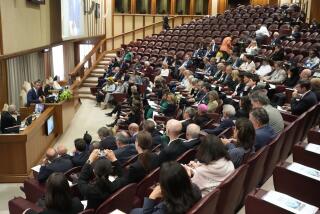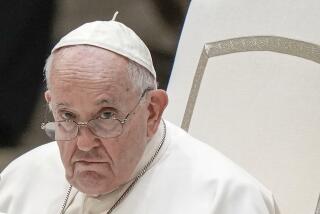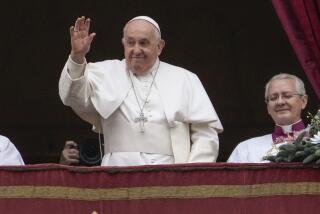Pope Warns of Global Ecological Crisis : Environment: Pontiff’s peace message attacks consumer greed and pillaging of resources.
VATICAN CITY — Crying out against man’s destruction of the natural environment, Pope John Paul II warned Tuesday that a global ecological crisis threatens not only the well-being of humanity but world peace as well.
The Pope attacked greedy consumerism, the pillaging of natural resources and the “indiscriminate application of science and technology” as elements in a global crisis he said is moral as well as material.
John Paul often speaks as a friend of the Earth, but his annual New Year’s Day peace message, the text of which was made public Tuesday, was his most detailed exposition of the church’s concern with international environmental problems.
“There is a growing awareness,” he said, “that world peace is threatened not only by the arms race, regional conflicts and continued injustices among peoples and nations but also by a lack of due respect for nature, by the plundering of natural resources and by a progressive decline in the quality of life.”
The fruits of the Earth are divinely intended as a common heritage for all mankind, he said, adding:
“It is manifestly unjust that a privileged few should continue to accumulate excess goods, squandering available resources, while masses of people are living in conditions of misery.”
Redressing “structural forms of poverty” in Third World countries, he said, must be part of environmental remedies endorsed by rich and poor alike.
Responsibility for protecting the environment and for limiting damage already inflicted, such as deforestation, depletion of the ozone layer and the greenhouse effect, he said, lies with “the entire human community--individuals, states and international bodies.”
He said: “The right to a safe environment is ever more insistently presented today as a right that must be included in an updated Charter of Human Rights.”
He appealed to modern society to take “a serious look at its life style” in a world given to “instant gratification and consumerism.”
“The seriousness of the ecological crisis lays bare the depth of man’s moral crisis,” he said, and he called for “simplicity, moderation, discipline as well as a spirit of sacrifice” as ingredients of a healthier global society.
One of the gravest moral implications underlying ecological destruction, he said, is “a lack of respect for life.”
“Despite the international agreements which prohibit chemical, bacteriological and biological warfare, the fact is that laboratory research continues to develop new offensive weapons capable of altering the balance of nature,” the Pope complained.
So too, he said, is nature threatened by industry and agriculture in an often destructive rush for quick material profit.
“Often the interests of production prevail over concern for the dignity of workers,” he said, “while economic interests take priority over the good of individuals and even entire peoples. Pollution or environmental destruction is the result of an unnatural reductionist vision which at times leads to a genuine contempt for man.”
He warned that “the reckless exploitation of natural resources” in the name of progress works not to man’s benefit but to his ultimate disadvantage.
Reiterating the church’s well-established suspicion of biological research, the message expressed “deep concern” over “indiscriminate genetic manipulation” and “unscrupulous development of new forms of animal and plant life.”
John Paul was as adamant as ever against “unacceptable experimentation regarding the origins of human life itself.”
“It is evident to all,” he said, “that in any area as delicate as this, indifference to fundamental ethical norms, or their rejection, would lead mankind to the very threshold of self-destruction.”
More to Read
Sign up for Essential California
The most important California stories and recommendations in your inbox every morning.
You may occasionally receive promotional content from the Los Angeles Times.









